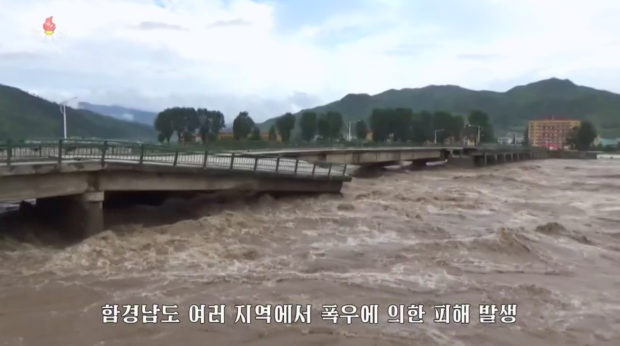
This captured image from the Korean Central Television on Thursday shows a bridge that was flooded and partly collapsed following heavy rains in North Korea’s South Hamgyong Province. Yonhap via The Korea Herald/Asia News Network
SEOUL — South Korea and the US are discussing the possibility of offering humanitarian assistance to North Korea as a way to engage the recalcitrant regime, but it remains to be seen whether Pyongyang is ready to return to dialogue.
South Korean Foreign Minister Chung Eui-yong and US Secretary of State Antony Blinken held phone talks Friday, during which the two officials consulted on avenues of cooperation with the North, including humanitarian cooperation, and agreed to continue their efforts to engage the North, according to the Foreign Ministry here.
The State Department also said the two had discussed recent developments in Pyongyang and “agreed to explore humanitarian initiatives on the Korean Peninsula.” Blinken also confirmed US support for inter-Korean dialogue and engagement, it added.
When inter-Korean communication channels reopened July 27, they raised hopes of renewed nuclear diplomacy with North Korea, though fresh tensions could arise in light of the upcoming Seoul-Washington military drills later this month. Pyongyang has warned that the joint exercises will cast a pall over inter-Korean ties, but reports Sunday cited government sources as saying they would go ahead.
Last week, director-level diplomats from Washington and Seoul met to discuss the resumption of talks with North Korea, and humanitarian assistance was part of the agenda as well.
At that meeting, the two countries discussed the current situation on the Korean Peninsula and prospects for humanitarian cooperation, according to the State Department. Present were US Deputy Special Representative Jung Pak; Rim Kap-soo, director general of the Foreign Ministry’s peace regime bureau; and officials from the Unification Ministry and Cheong Wa Dae.
The Unification Ministry also confirmed that the two sides had discussed providing humanitarian assistance to improve inter-Korean relations and revive US-North Korea talks, and said they had looked at areas where the two Koreas could cooperate independently.
The ministry is also reportedly reviewing ways to provide around 10 billion won ($8.7 million) to private aid organizations for cooperative humanitarian projects in the North.
In response, a ministry official said the government was reviewing various ways to support local civic organizations in carrying out humanitarian aid efforts, based on the principle that humanitarian cooperation between the two Koreas needs to continue regardless of the political and military situation.
Seoul is holding out hope that humanitarian support may bring Pyongyang back to the negotiating table, considering the chronic food shortages in the North due to the protracted COVID-19 crisis and typhoon damage from last year.
This year, the food situation is expected to worsen amid severe weather conditions. The North’s state media reported Thursday that thousands of homes had been destroyed last week and some 5,000 people evacuated due to heavy rain and flooding.
But Pyongyang has repeatedly refused offers of aid, and earlier last month, the North accused the US of using humanitarian aid as “sinister political scheme” to put pressure on other countries
Observers say the current situation might be dire enough to prompt Pyongyang to accept Seoul’s humanitarian assistance this time, but that connecting the aid to nuclear talks could be tough. The North insists it won’t restart talks unless the US withdraws its hostile policy, an apparent reference to sanctions.
Another major challenge appears to be the US-South Korea military exercises, which Pyongyang has frequently denounced, calling them a rehearsal for an invasion.
With the allies likely to go ahead with the military drills, albeit in a scaled-back manner, they could provoke Pyongyang and dent prospects for further engagement.